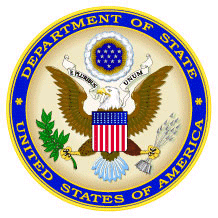| How
does a country qualify for Visa Waiver Program (VWP) participation?
The Visa Waiver Program
(VWP) enables citizens of certain countries to travel to the United States
for tourism or business for 90 days or less without obtaining a visa.
Not all countries participate in the VWP. There are a number of requirements
which must be met, as explained below, for a country to be considered
for the Visa Waiver Program.
Refusal rate
In order to qualify
for VWP participation, the nonimmigrant visitor ("B-1/B-2" visa
category) refusal rate for nationals of a country who have applied at
a U.S. Embassy or Consulate in that country must average less than 3%
for the previous fiscal year.
Once a country
meets the refusal rate criteria, a number of other factors must be evaluated
before a decision on VWP nomination can be made:
Reciprocity
- VWP candidate
countries must provide reciprocal visa-free travel for U.S. citizens.
Passport security
- A country must
have a machine readable passport (MRP) program in place in order to
qualify for VWP participation.
- In addition, VWP
candidate countries must demonstrate that adequate safeguards against
fraudulent use of their passports are in place, including proper storage
of blank passports and sufficient screening of passport applicants.
- Consideration
will also be given to the ease with which host country citizenship can
be obtained.
Political
and economic stability
- Countries under
consideration for VWP participation must be sufficiently stable to ensure
that conditions which could affect VWP qualifying criteria (such as
overstay rates in the U.S.) are not likely to change dramatically in
the future.
Border controls
- VWP candidate
countries must demonstrate that effective border controls are in place
for all territory under their control.
- Factors taken
into consideration include the thoroughness and consistency of entry
checks as well as the extent to which the country's territory is used
as a transit point for alien smugglers.
Law-enforcement
cooperation
- The degree to
which host country law enforcement agencies cooperate with U.S. counterparts
as well as international entities such as Interpol will be considered.
- The Attorney General,
in consultation with the Secretary of State, must evaluate the nominee
country's interest in enforcement of U.S. immigration laws, and the
existence and effectiveness of extradition agreements with the U.S.,
including extradition of its own nationals who violate US laws.
- The Attorney General
must submit a report to Congress on the country's qualification for
designation that includes an explanation of a favorable determination.
Security concerns
- Any security concerns
that could be raised by a country's admission into the VWP program will
be considered.
Is there a
probationary program for VWP entry?
- No. The probationary
status entry program, designed for countries with a refusal rate of
less than 3.5 percent but more than 2 percent, was eliminated by the
new immigration legislation signed into law in September 1996. Therefore,
no more countries may be admitted in probationary status.
How does the
nomination process work?
- The nomination
process is based on a 1997 protocol established between the Departments
of State and Justice. Under this protocol, the State Department initiates
the process by advising the Department of Justice of its intent to nominate
a country for consideration for inclusion in the VWP.
- The Department
of State may only nominate a country once it determines that each the
first three qualifications listed above (including refusal rate below
3%, reciprocal treatment for American citizens, and machine readable
passport program in place) have been met. If all three of these criteria
have not been met, or if the Department of State believes that deficiencies
in the other qualification areas are significant, the Department will
not nominate a country.
- Once the Department
of State has advised the Department of Justice of its intent to nominate
a country, an interagency team reviews the nomination, focusing on the
impact inclusion of the country in VWP would have on law enforcement,
national security, and immigration control. If no clearly disqualifying
objections are raised during this prenomination review, the Secretary
of State submits a formal written nomination to the Attorney General.
- After a country
is formally nominated, BCIS leads a site team of representatives from
interested agencies to visit the nominated country. The team reviews
the nominee country’s political, social, and economic condition;
the security of its passport and national identity documents; its border
controls, immigration and nationality laws, and law enforcement policies
and practices; and other matters that nay be of law enforcement, immigration,
or national security concern. Based on the prenomination review and
site visit, the interagency working group submits a recommendation to
the Attorney General, who then makes the ultimate decision on VWP participation.
Return
to Visa Services Page
Return
to Consular Affairs Page
(April 2003)
|

